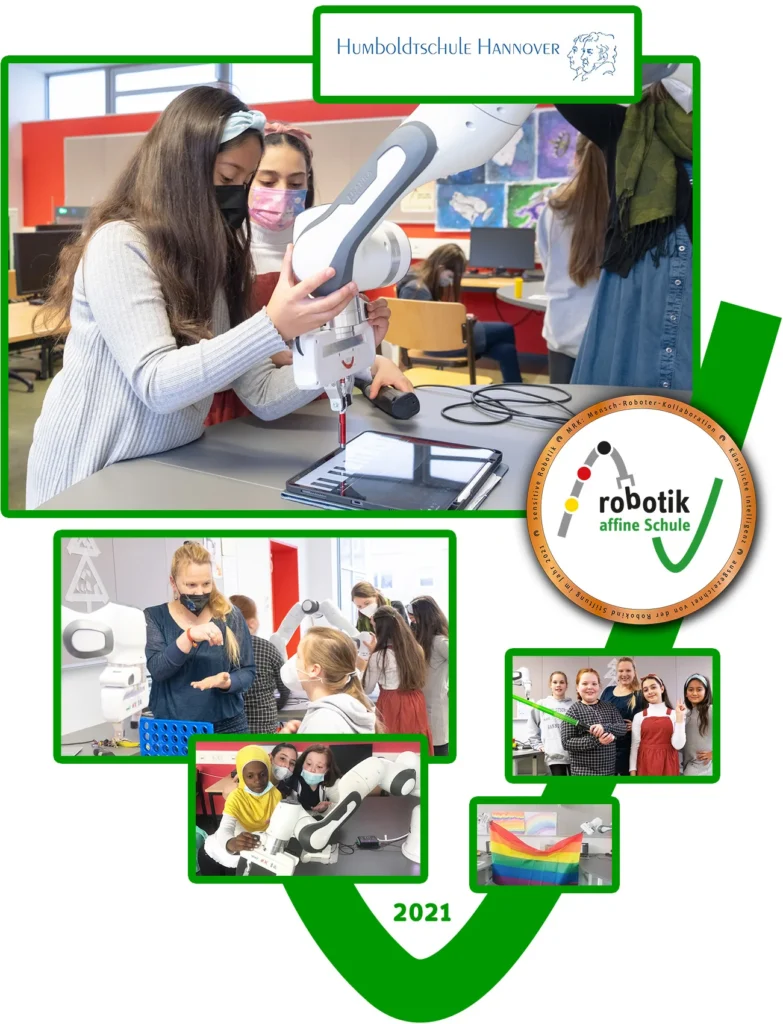
School with an affinity for robotics: Humboldt Schule Hannover

Children should come into contact with this topic at an early age, because robots will seriously change our everyday lives in the future. “StR’ Wiebke Kontzog, Teacher Humboldt School Hanover
”StR‘ Wiebke Kontzog, Teacher Humboldt School Hanover
Why did you decide to teach robotics?
We see robotics as an absolute future topic. To this end, we will set up a technology lab at the Humboldt School, which will give us a great opportunity to introduce the younger generation to digitization, automation and other technological topics of the future. An understanding of these topics is crucial for children to understand and creatively shape the world that surrounds them, enabling them to act in a self-determined manner and to have career prospects. We think it is important that robotics and related technology topics take place at a “normal” general education school so that they are open to all children.
In which subjects and grades is robotics taught?
We will start with “Franka” in the AG area in order to test problem-oriented learning on our own projects. Gradually, the robots will be integrated into the computer science area, but also into other subjects. There are no limits to the possibilities here; the robots can be used in art projects, science experiments, mathematical challenges, but also in the area of politics and economics and much more. As an orientation framework, a stage concept was developed, which should enable an age- and interest-appropriate integration of the robot system into the different age levels: 1. lower level: Fascinate (introduction; creative, playful discovery) 2. middle level: Qualify (knowledge building, competitions, future day) 3. upper level: Specialize
(career orientation, projects, internships) Thus, the system can be integrated in very different learning situations.
Presentation of deployment scenarios
Our framework concept is the step-by-step model listed above. The aim is to deal creatively with this new, forward-looking technology, to think up and implement our own projects. We are entering completely new territory with the topic of MRC – human-robot collaboration in the school sector. However, we are looking forward to giving children and young people the opportunity to immerse themselves in new technologies and exciting fields of science in a playful, discovering and safe way. Ideas for concrete use: Support of scientific experiments Art projects (light painting, writing and writing, dripping a la Jackson Pollock, Franka as a drawing machine, Spyromat, Zen painting, stamping technique) Workshop work: Support of craft processes through precision and repeatability e.g. linocut, clay processing (building shells), compare additive vs. subtractive processes Robot arm as camera tripod resp. -Mathematics: – dealing with the Cartesian coordinate system, solving the mathematical puzzle and patience game e.g. “The Towers of Hanoi” (introduction of the app: pick and place, motion sequences) dealing with multi-dimensional functions in mathematics (e.g. Jacobi matrix) Computer science: automation technology, robotics as an approach to computer science education – content areas and learning objectives: Computer Science Systems: …
We are multipliers because…
“… there is a magic in every beginning, which protects us and helps us to live”. (H.Hesse) We believe that future topics belong in school and that children must be given access to them at an early age. We are fascinated by the topic of “robotics in the classroom”. We ask ourselves how to apply proven methods in a new context. We have a high level of acceptance among the staff and a very broad willingness to fill this topic with life in everyday school life. Proof of this is that there are already several people interested in Robokind training. We are already very well networked with other schools via Robokind, N21, the Lower Saxony Education Cloud, as well as the direct exchange after the Robokind training and are looking forward to passing on our knowledge to other schools and partners and to awaken their enthusiasm for the topic. This is where my role as a certified trainer for collaborative robots comes in handy.
Contact
Humboldtschule Hannover
Ricklinger Str. 95
30449 Hannover
Phone: (0511) 168 – 440 34
Website: https://www.humboldtschule.de/
Contact person W. Kontzog: kontzog.w@humboldtschule.de